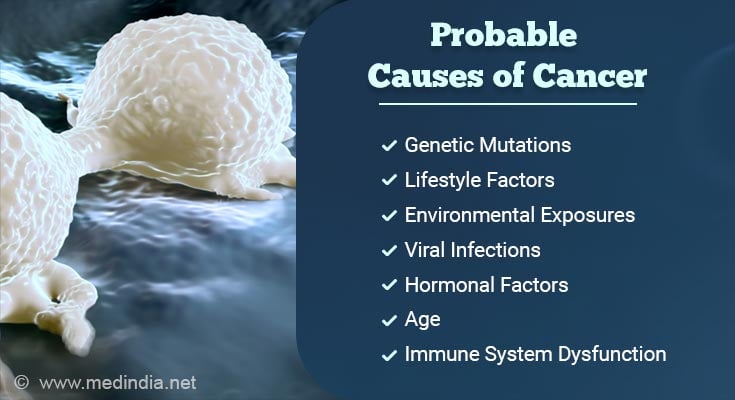- Lifestyle habits like stress, obesity, and smoking contribute to cancer risk
- Early detection through screenings and vaccinations is key to improving cancer outcomes
- Adopting a healthy lifestyle and staying vigilant for symptoms can reduce cancer incidence
Cancer remains a formidable global health challenge, claiming approximately 10 million lives worldwide in 2020 alone. In India, the burden of cancer is escalating, with over 1.4 million reported cases in 2022, expected to rise to over 1.5 million by 2025. This surge underscores the urgent need for heightened awareness, prevention strategies, and early detection measures (1✔ ✔Trusted Source
Cancer is a Preventable Disease that Requires Major Lifestyle Changes
).
While hereditary mutations contribute to about 10% of cancer cases, lifestyle factors play a significant role in predisposing individuals to this disease. Unhealthy lifestyle habits such as stress, obesity, poor dietary choices, smoking, and tobacco use significantly elevate the risk of cancer development. Understanding and addressing these modifiable risk factors are crucial steps in reducing cancer incidence.
Advertisement
Lifestyle and Cancer Risk
Stress
:
Chronic stress not only impacts mental well-being but also weakens the body’s immune system and disrupts hormone balance, potentially increasing susceptibility to cancer. Incorporating stress-relief techniques such as mindfulness, meditation, and regular exercise can help mitigate this risk.
Obesity and Poor Diet
:
Obesity is a well-established risk factor for various cancers, including breast, colon, kidney, and pancreatic cancers. A diet rich in processed foods, saturated fats, and low in fruits and vegetables further exacerbates this risk. Adopting a balanced diet comprising whole grains, lean proteins, and plenty of fruits and vegetables can help maintain a healthy weight and reduce cancer risk.
Smoking and Tobacco Use
:
Tobacco use remains one of the leading preventable causes of cancer worldwide. Smoking not only increases the risk of lung cancer but also contributes to cancers of the mouth, throat, esophagus, pancreas, bladder, prostate and cervix. Quitting smoking and avoiding exposure to secondhand smoke are essential steps in cancer prevention.
Advertisement
Other Causes of Cancer
Genetic mutations
:
Inherited genetic mutations, as well as acquired mutations over time, can lead to uncontrolled cell growth and cancer development.
Environmental exposures
:
Exposure to carcinogens in the environment, such as asbestos, radiation, air pollution, and certain chemicals, can increase the risk of cancer.
Viral infections
:
Certain viruses, such as human papillomavirus (HPV), hepatitis B and C viruses, and Epstein-Barr virus (EBV), are linked to an increased risk of developing specific types of cancer.
Hormonal factors
:
Hormonal imbalances or exposure to hormones, such as estrogen and progesterone in hormone replacement therapy or birth control pills, may contribute to the development of certain cancers, like breast and uterine cancer.
Age
:
Cancer risk generally increases with age, as cells accumulate genetic mutations over time.
Immune system dysfunction: A weakened immune system due to conditions like HIV/AIDS or immunosuppressive medications can increase susceptibility to certain cancers.
Advertisement
Early Detection: A Key to Survival
Early detection is paramount in improving cancer outcomes. Approximately 30% to 50% of cancer cases can be prevented or effectively treated if detected early. Recognizing the signs and symptoms of cancer, such as unexplained bleeding, lumps, persistent coughing, chest pain, unexplained weight loss, and changes in bowel habits, can prompt early medical intervention and improve prognosis.
Early detection plays a pivotal role in combating cancer, as 30% to 50% of cases can be prevented through timely identification, risk reduction, and appropriate treatment interventions. Regular cancer screenings, including mammography for breast cancer and HPV testing for cervical cancer, are vital for early detection and timely treatment initiation. Vaccinations against hepatitis B and human papillomavirus (HPV) significantly reduce the risk of liver and cervical cancers, respectively, further underscoring the importance of preventive healthcare measures.
In conclusion, cancer prevention requires a multifaceted approach that addresses both genetic and lifestyle factors. By adopting healthy lifestyle habits, staying vigilant for early warning signs, and prioritizing regular screenings and vaccinations, individuals can take proactive steps towards reducing their cancer risk and promoting overall well-being. Together, we can strive towards a future where cancer incidence is minimized, and lives are saved through early detection and prevention efforts.
Reference:
- Cancer is a Preventable Disease that Requires Major Lifestyle Changes – (https://www.ncbi.nlm.nih.gov/pmc/articles/PMC2515569/)
Source-Medindia



